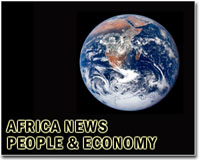| . |  |
. |
Kinshasa, Democratic Republic Of Congo (UPI) Sep 2, 2010 A little-noticed amendment in the new U.S. financial reform law requires U.S.-listed companies to disclose whether their products contain "conflict minerals" from the seemingly endless war in the Democratic Republic of Congo. This law, the first of its kind in the world, will affect thousands of U.S. companies. So it is expected to have a broad impact since minerals such as tungsten, tin, tantalum and gold are widely used in the manufacture of cellphones, laptop computers, digital cameras and a wide range of popular products. European countries may enact similar legislation. But it remains to be seen whether such efforts will curb the systematic orgy of plundering the DRC's mineral riches by armed groups, including the Congolese military, backed by other African states in one of the bloodiest conflicts since World War II. A recent report by the International Peace Information Service, based in Antwerp, Belgium, and funded by the European Commission, points to how extensive the DRC's armed forces are engaged in fighting each other for control of the mineral-rich eastern part of the country and its mining operations. It highlighted the Ituri region in the east, one of the most fought-over mineral zones in a war in which an estimated 5 million people have died since it erupted in 1994 in the wake of the Rwanda genocide. The International Red Cross estimates 45,000 people die every month, mainly of starvation and disease. IPIS reported that a Congolese army officer identified as Maj. Massamba, deputy commander of the 13th Brigade and a former bodyguard of the land forces chief Gen. Gabriel Amisi, was allegedly involved in attacks on miners in North Kivu Province in 2007. He was subsequently reported to be active in the gold-producing Bavi region. The military's 4th Brigade now dominates the Mongbwalu region near the AngloGold Ashanti Ltd mining concessions, IPIS reported. Other elements of the brigade have deployed around mining concessions in Oriental province, it added. In the diamond-producing areas of Aketi and Buta, it said rebels of the Forces de Resistance Patriotique de Ituri, are suspected of trafficking in minerals and also operate in the Bavi gold region. The Mai Mai Kumu militia, led by Maj. Luc Yabli, are rampaging in the Maiko National Park region that straddles the provinces of North Kivu, Oriental and Maniema, IPS said. Another militia, the Mai Mai Simba, effectively rule in the Silisa region of Maniema and specialize in trafficking in gold, diamonds, coltan and cassiterite. Coltan, also known as tantalum, is used in electronic devices such as cell phones and computers. Indeed, the DRC has holds an estimated one-fifth of the world's tantalum. Carriterite, or tin ore, is widely used in the electronics industry. The Congo also has extensive deposits of uranium and wolframite, the ore for tungsten which is used to manufacture mobile phones. The various states in the Great Lakes region have largely financed their military forces by plundering the DRC's minerals, timber and other resources, particularly the "three Ts -- tin, tungsten and tantalum. Global Witness, a British human rights organization, says that "mineral exploitation and trade in the DRC has proven so lucrative that it has become almost an end in itself for all the warring parties -- from the official national army brigades to the numerous and shape-shifting rebel coalitions." The new U.S. law requires American companies to report to the Securities and Exchange Commission whether their products contain minerals from the rebel-controlled mines in the DRC or neighboring countries through which "conflict minerals" are smuggled out. If so they have to state what measures they are taking to ascertain the minerals' origins. But the law doesn't impose any penalty on companies that don't take any such action, although they have to publicly disclose this. The State and Treasury Departments are considering possible economic sanctions against U.S. companies that use "conflict minerals" that help fund rebel militias and renegade forces but it's widely believed these measures aren't tough enough to have a meaningful effect. "What really needs to happen is the international community needs to redouble its efforts to bring an overall diplomatic solution to what going in Congo," declared Rick Goss, vice president of environment at the U.S. Information technology Industry Council.
Share This Article With Planet Earth
Related Links Africa News - Resources, Health, Food
 Rwanda threatens Sudan peacekeeper pullout over UN report
Rwanda threatens Sudan peacekeeper pullout over UN reportKigali (AFP) Aug 31, 2010 Rwanda will withdraw more than 3,000 peacekeepers from Sudan if the United Nations publishes a report on war crimes allegedly committed by Kigali in the Democratic Republic of Congo (DRC), an army spokesman said Tuesday. "The Rwanda Defence Force (RDF) has finalised a contingency withdraw plan for its peacekeepers deployed in Sudan in response to a government directive in case the UN publish ... read more |
|
| The content herein, unless otherwise known to be public domain, are Copyright 1995-2010 - SpaceDaily. AFP and UPI Wire Stories are copyright Agence France-Presse and United Press International. ESA Portal Reports are copyright European Space Agency. All NASA sourced material is public domain. Additional copyrights may apply in whole or part to other bona fide parties. Advertising does not imply endorsement,agreement or approval of any opinions, statements or information provided by SpaceDaily on any Web page published or hosted by SpaceDaily. Privacy Statement |